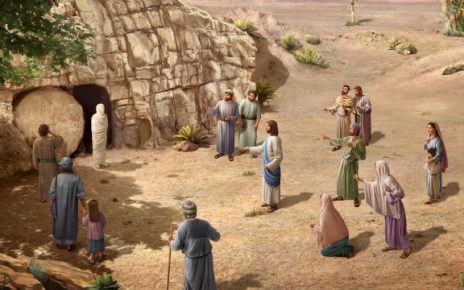The answer from God’s word:
“The work done by God Godself is a work that involves all mankind andfrom The Church of Almighty God is also a work that represents the entire age. That is to say, the work of God Godself represents the movement and the trend of all the work of the Holy Spirit. But the work of the apostles is to continue the work after the work of God Godself, and it is not to lead the age and does not represent the trend of the work of the Holy Spirit in the entire age. They are only doing the work man should do, which does not involve the management work. The work done by God Godself is an item in the management work, and the work done by men is only the duty performed by the men used, which has nothing to do with the management work. Because their identities and what their works represent are different, although the work of God Godself and men’s work are both the works of the Holy Spirit, there are always obvious substantive differences between them.”
from “God’s Work and Man’s Work” in The Word Appears in the Flesh
“What God expresses is what God Godself is, which is beyond man’s capacity, that is, beyond the reach of man’s mind. He expresses his work of leading all mankind, which has nothing to do with man’s detailed experience but has to do with his own management. What man expresses is man’s experience; what God expresses is God’s being, and this being is God’s original disposition and is beyond man’s capacity. Man’s experience is his seeing and knowledge gained based on God’s expressing what he is. All these seeing and knowledge are called what man is. They are expressed on the basis of man’s original disposition and qualities, so they are called what man is.”
from “God’s Work and Man’s Work” in The Word Appears in the Flesh
“If men did the work, it would be too limited, and they could only work man to a certain extent but could not bring man into the eternal destination. Men cannot decide man’s destiny, much less secure man’s future and future destination. But the work done by God is different from the work done by men. Since he created man, he will lead man. Since he saves man, he will save man thoroughly and gain man completely. Since he leads man, he can bring man into the proper destination. Since he created man and manages man, he will be responsible for man’s destiny and future. This is the work done by the Creator.”
from “Recover Man’s Normal Life and Bring Man into the Pleasant Destination”in The Word Appears in the Flesh
“In the Age of the Grace, Jesus also spoke many words and did many works. What differences were there between him and Isaiah? What differences were there between him and Daniel? Was he a prophet? Why was he called the Christ? What differences were there between them? They all were men, and they all spoke words. Moreover, in people’s eyes, their words were similar, and they all spoke words and did works. The Old Testament prophets spoke prophecies, and likewise Jesus could also speak prophecies. What is this all about? You should distinguish him according to the nature of his work. To discern this, you should not look at the nature of his flesh or whether his words were profound or shallow. Anyway, you should first look at the work he did and what results the work produced on people. The prophecies Isaiah spoke at that time were not to supply people’s life, and the revelations received by the men like Daniel were only prophecies and not the ways of life. At that time, if Jehovah had not given revelations directly, none of them could have done those works, which were beyond the mortals’ capacity. Jesus also spoke many words, but these words were the ways of life, and people could find ways of practice from them. This is to say, first, Jesus could supply people’s life, because he was the life; second, he could correct people’s deviations and errors; third, he could continue Jehovah’s work to continue the age; fourth, he could touch what people needed within and know what people lacked; fifth, he could start a new age and end the old age. So, he was God, and he was the Christ. He was not only different from Isaiah but also different from any other prophet. Take the work done by the prophets, like Isaiah, to make a comparison. First, he could not supply life to people; second, he could not start an age, and he worked under Jehovah’s leading and did not work to start a new age; third, the words he spoke were beyond his own capacity and were directly revealed by God’s Spirit, and others also could not understand them after hearing. These several things can prove that the words he spoke were only prophecies and were only a work he did in Jehovah’s stead, but he could not fully represent Jehovah. He was Jehovah’s servant and was an instrument in Jehovah’s work. He only worked within the Age of the Law and within the scope of Jehovah’s work, and he did not work outside the Age of the Law. However, the work Jesus did was different. He went beyond the scope of Jehovah’s work, he worked by appearing as the incarnated God, and he did the work of crucifixion to redeem all mankind. In other words, he did a new work outside Jehovah’s work. This was opening an age. Besides, he could speak some words that were beyond man’s capacity. The work he did was a work within God’s management and was a work that had to do with all mankind, not a work for a few people or a work to lead a limited number of people. As to how God was incarnated to be a man, how the Spirit gave revelations at that time, and how the Spirit descended on a man to work, people cannot see or touch them, and they simply cannot use these facts to prove that he was the incarnated God. They can only discern that by God’s words and works they can contact. This is realistic. Because you cannot see the things of the Spirit, which only God Godself knew clearly and which even the incarnated flesh did not know fully, you can only make certain through the work he did. From the work he did, you can see: First, he could start an age; second, he could supply people’s life and point out to people the way they should walk. Thus you can be certain that he was God Godself. At least, the work he did could fully represent God’s Spirit, and from the work he did you can see that he had God’s Spirit in him. Because the work the incarnated God does is mainly to open a new age, lead a new work, and open up a new state, you can by these several things make certain that he was God Godself. Thus you can distinguish him from the great prophets like Isaiah and Daniel.”
from “The Difference Between the Ministry of the Incarnated God and the Duty of Man”in The Word Appears in the Flesh
“You have to know how to distinguish between God’s work and man’s work. What can you see from man’s work? Man’s work has many elements of man’s experience, and what man expresses is what man is. When God works, he is also expressing what he is, but what he is is different from what man is. What man is represents man’s experiences and man’s life (what man has experienced or encountered in his life, or what philosophies of life he has), and the being expressed by men who live in different environments is different. Whether or not you have experienced the things of society and how you live and experience in your family can be seen from your expression. However, you cannot see from the work of God incarnate whether he has social experience. He knows man’s essence very well and can disclose all kinds of practices of all kinds of men and even more man’s corrupt disposition and disobedient acts; he does not live among the ‘worldly people,’ but he knows the nature of the ‘mortals’ and all the corruptions of the ‘worldly people.’ This is what he is. Although he has never contacted society, he knows the conventions and rules in dealing with the world, because he has fully known man’s nature. He can know the Spirit’s work that man’s eyes cannot see and man’s ears cannot hear, both of the present and of the past. Here is contained the wisdom which is not philosophy of life and the wonderfulness unfathomable to man. These are what he is, which is open to man and also hidden from man. What he expresses is not what an extraordinary man is but the original attributes and being of the Spirit. He does not travel to all the countries, but he knows the things of the entire world. He contacts the ‘anthropoids’ that have no knowledge and no insight, but he expresses words higher than knowledge and above great men. He lives among a group of obtuse and numb people who have no humanity and who do not know normal human rules or human life, but he can require mankind to live out a normal humanity, and at the same time he discloses mankind’s base and low humanity. All these are what he is, which is higher than what any fleshly man is. It is unnecessary for him to experience the complex, burdensome, and sordid social life before he can do the work he ought to do and thoroughly disclose the essence of corrupt mankind. The sordid social life cannot edify his flesh. His working and speaking is just to disclose man’s disobedience, not to supply man with experience and lessons of dealing with the world. He does not need to investigate society or investigate man’s family before he supplies man with life. His exposing and judging man is not to express the experiences of his flesh, but to disclose man’s unrighteousness after he has long known man’s disobedience and hated mankind’s corruption. All the work he does is making known his disposition and expressing his being to man. Such work can only be done by him, not by fleshly man. As far as his work is concerned, people cannot tell what kind of man he is. Nor can they classify him among created men according to his work or by what he is. Thus they can only class him among nonhuman beings, yet they do not know which category he should belong to, so they can only put him in the category of ‘God.’ It is not without reason that they do so, because he has done many works among them that man cannot do.”
from “God’s Work and Man’s Work” in The Word Appears in the Flesh



